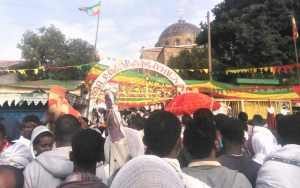Protecting the devoted from cholera in pilgrimage sites in Ethiopia
The pilgrims sometimes come by the thousands. They come by foot, by vehicle and by air to the many churches and monasteries scattered around the once ancient Christian kingdom of Ethiopia. They seek piety in their communing, but it is in the very density of their shared pilgrimage that dangerous diseases like cholera can thrive – if appropriate conditions are not prepared for them.
Chief among the pilgrimages is the feast of the archangel Gabriel, celebrated in July and December by followers of the Ethiopian Orthodox Church. Along with festivities in individual churches, the major celebration ignites the small town of Kulubi, in the eastern Hararghe Zone of Oromia Region, where tens of thousands of pilgrims from within the country and abroad descend on Kulubi St Gabriel church.
Such large population movements and gatherings, for any reason, create favourable environments for cholera transmission because ensuring safe hygiene conditions is an enormous challenge. The sensitivity of a situation is compounded where there is an ongoing outbreak, such as the one Ethiopia is currently experiencing. A case of cholera was first reported on 25 April 2019 in the Amhara Region, in the north-western part of the country. Since then, six other regions have reported cholera outbreaks, with most of the cases reported from Amhara, Oromia and Afar regions and in the capital, Addis Ababa.
To better prepare for the volume of people who visit Kulubi town for varying lengths of time, the Oromia Regional Health Bureau and the Ethiopian Public Health Institute, with support from World Health Organization (WHO) and partner agencies, recently installed latrines with handwashing stations, set up cholera treatment centres and emergency clinics and dug pits for the safe disposal of solid waste. With the use of an advocacy van, mobile education teams spread hygiene messages on safe food preparation and handling as well as cholera prevention and control.
The WHO efforts on cholera control and elimination during an outbreak includes assisting regional health and water bureaus and partners for inspecting and monitoring water quality. Where cholera treatment centres have been established, WHO specialists in water, sanitation and hygiene also provide technical guidance to regional health workers on preparing different strengths of chlorine solution and ensuring that there are adequate sanitation facilities and shower rooms available.
Dr Aggrey Bategereza, WHO Representative a.i. for Ethiopia, emphasized the importance of joint efforts in preventing the spread of cholera: “This collaborative work in addressing prevention during religious festivals, and especially with the support of the religious leaders, gives us a fighting chance to control and possibly even eliminate cholera from Ethiopia.”
With communicable diseases like cholera easily transmitted wherever there is high population density and mobility, all water, sanitation and hygiene interventions for mass gatherings for any purpose are vital to prevent the spread of disease.
Emergency WASH Team Lead
WHO Ethiopia Health Emergencies Programme
Tel: +251 929 097 014
E-mail: amareworkiyen [at] who.int
Communications Officer
Email: negasht [at] who.int
Communications Officer, WHO Africa Health Emergencies Programme
Tel: +242 06 508 1009
Email: okas [at] who.int




